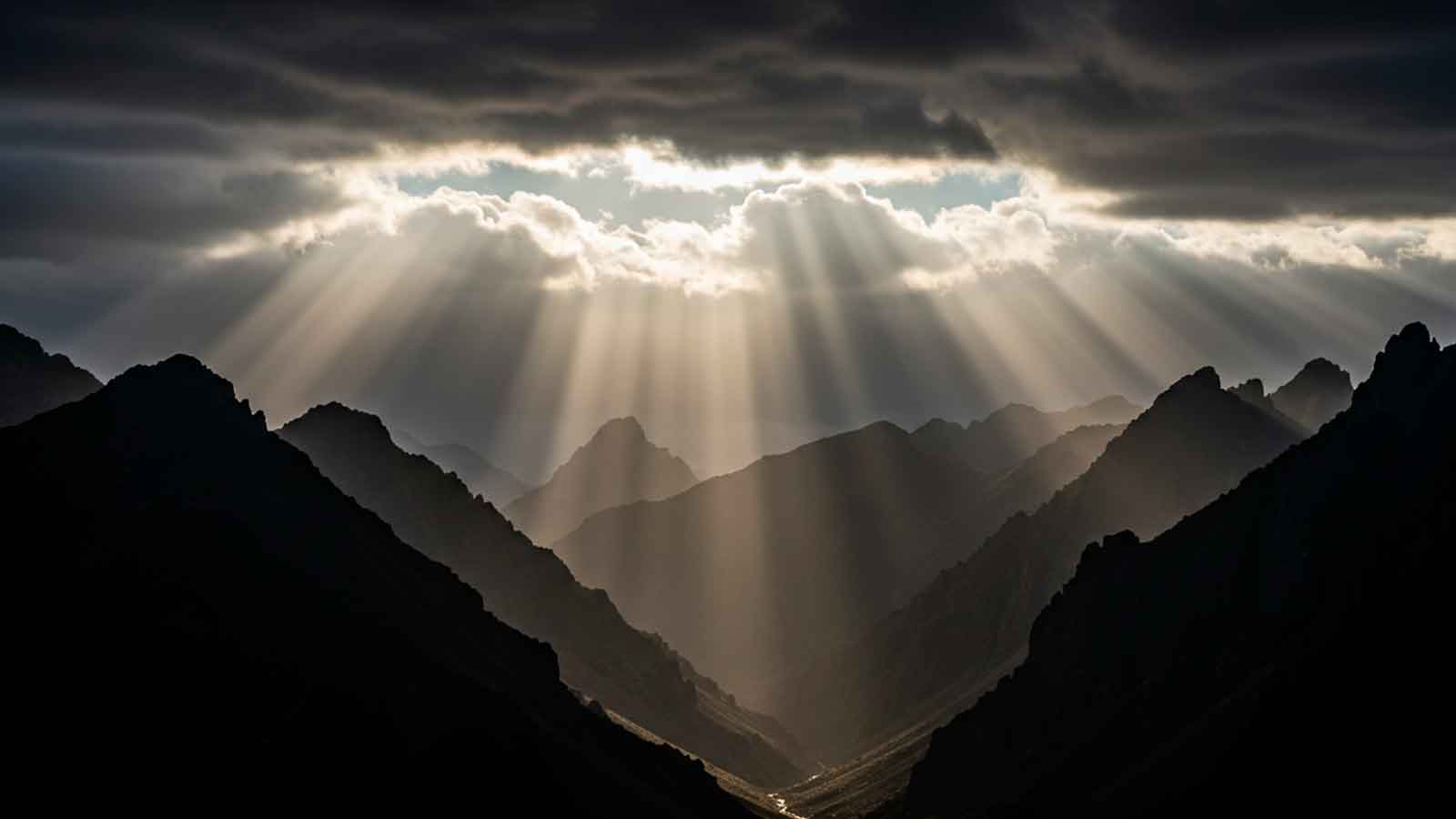Psalm 68
Psalm 68 is one of the most triumphant compositions in the Book of Psalms. It exalts the majesty of God, depicts His power over enemies, and celebrates His goodness toward His faithful people. With poetic, powerful language, this psalm blends images of war, sacred processions, and acts of justice, pointing to a God who guides, protects, and conquers. In this article, we will explore Psalm 68 in depth—its meanings, spiritual applications, and inspiring messages.
Full Text of Psalm 68
¹ Let God arise, let His enemies be scattered; let those who hate Him flee before Him.
² As smoke is driven away, so You drive them away; as wax melts before the fire, so let the wicked perish before God.
³ But let the righteous be glad; let them rejoice before God; yes, let them delight with joy.
⁴ Sing to God, sing praises to His name; extol Him who rides upon the clouds—LORD is His name—rejoice before Him.
⁵ A Father to the fatherless and a Defender of widows is God in His holy dwelling.
⁶ God sets the solitary in families; He brings out those who are bound into prosperity, but the rebellious live in a sun-scorched land.
⁷ O God, when You went forth before Your people, when You marched through the wilderness — Selah —
⁸ the earth shook, and the heavens poured rain at the presence of God; Sinai itself trembled at the presence of God, the God of Israel.
⁹ You, O God, sent a plentiful rain; You restored Your inheritance when it was weary.
¹⁰ Your flock lived there; You, O God, prepared Your goodness for the poor.
¹¹ The Lord gave the word; great was the company of those who proclaimed it.
¹² Kings of armies flee in haste, and the woman who stayed at home divided the spoil.
¹³ Though you lie among the sheepfolds, you will be like the wings of a dove covered with silver, whose feathers are of shimmering gold.
¹⁴ When the Almighty scattered kings there, it was as white as snow on Zalmon.
¹⁵ The mountain of God is like the mountain of Bashan, a lofty mountain like the mountain of Bashan.
¹⁶ Why do you gaze in envy, you lofty mountains? This is the mountain God desires to dwell in—indeed, the LORD will dwell there forever.
¹⁷ The chariots of God are twenty thousand, thousands upon thousands; the Lord is among them, as He was in Sinai, in the holy place.
¹⁸ You ascended on high, You led captivity captive, You received gifts among men, even among the rebellious, that the LORD God might dwell there.
¹⁹ Blessed be the Lord, who daily loads us with benefits—the God of our salvation. Selah.
²⁰ Our God is the God of salvation; and to GOD the Lord belong escapes from death.
²¹ But God will crush the head of His enemies, the hairy scalp of the one who walks in his guilt.
²² The Lord said, “I will bring them back from Bashan, I will bring them back from the depths of the sea,”
²³ that your foot may be dipped in the blood of your enemies, and the tongues of your dogs have their share of the foe.
²⁴ They have seen Your procession, O God—the procession of my God, my King, into the sanctuary.
²⁵ The singers went before; the musicians followed after; among them maidens played tambourines.
²⁶ Bless God in the congregations—bless the LORD, you who are of the fountain of Israel.
²⁷ There is little Benjamin, leading them, the princes of Judah in their company, the princes of Zebulun and the princes of Naphtali.
²⁸ Your God has commanded your strength; strengthen, O God, what You have done for us.
²⁹ Because of Your temple at Jerusalem, kings will bring presents to You.
³⁰ Rebuke the beast of the reeds, the herd of bulls with the calves of the peoples, until each one submits with pieces of silver; scatter the peoples who delight in war.
³¹ Princes shall come out of Egypt; Ethiopia shall quickly stretch out her hands to God.
³² Sing to God, you kingdoms of the earth; sing praises to the Lord. Selah.
³³ To Him who rides on the heavens of heavens, which are of old—behold, He sends out His voice, a mighty voice.
³⁴ Ascribe strength to God; His majesty is over Israel, and His strength is in the clouds.
³⁵ O God, You are awesome from Your sanctuaries; the God of Israel is He who gives strength and power to His people. Blessed be God!

Psalm 68 — Complete Explanation, Verse by Verse
Psalm 68:1
“Let God arise, let His enemies be scattered; let those who hate Him flee before Him.”
A cry for action. The psalmist asks God to reveal Himself as Warrior and Judge, scattering enemies like morning fog.
Psalm 68:2
“As smoke is driven away, so You drive them away; as wax melts before the fire, so let the wicked perish before God.”
God’s power is likened to fire and wind—irresistible, consuming all wickedness.
Psalm 68:3
“But let the righteous be glad; let them rejoice before God; yes, let them delight with joy.”
In contrast to the destruction of the wicked, the righteous experience joy and fullness in God’s presence.
Psalm 68:4
“Sing to God, sing praises to His name; extol Him who rides upon the clouds—LORD is His name—rejoice before Him.”
A universal call to worship. God is exalted as Sovereign riding the heavens and deserving of praise.
Psalm 68:5
“A Father to the fatherless and a Defender of widows is God in His holy dwelling.”
God is portrayed as the protector of the defenseless, revealing His just and compassionate character.
Psalm 68:6
“God sets the solitary in families; He brings out those who are bound into prosperity, but the rebellious live in a sun-scorched land.”
God restores homes and frees captives, yet rebels are left to isolation and spiritual drought.
Psalm 68:7
“O God, when You went forth before Your people, when You marched through the wilderness — Selah.”
A recollection of the Exodus: God’s faithful presence guiding His people through the desert.
Psalm 68:8
“The earth shook, and the heavens poured rain at the presence of God; Sinai itself trembled at the presence of God, the God of Israel.”
Nature quakes before the Lord. Mount Sinai, symbol of covenant, is shaken by divine glory.
Psalm 68:9
“You, O God, sent a plentiful rain; You restored Your inheritance when it was weary.”
God provides sustenance; rain represents blessing and care in times of scarcity.
Psalm 68:10
“Your flock lived there; You, O God, prepared Your goodness for the poor.”
God’s inheritance—His people—is supplied by His goodness, especially the needy.
Psalm 68:11
“The Lord gave the word; great was the company of those who proclaimed it.”
The victory message is proclaimed by many, echoing the importance of enthusiastic testimony.
Psalm 68:12
“Kings of armies flee in haste, and the woman who stayed at home divided the spoil.”
God wins for His people; even those who did not fight share in the spoils He provides.
Psalm 68:13
“Though you lie among the sheepfolds, you will be like the wings of a dove covered with silver, whose feathers are of shimmering gold.”
A poetic image of the transformation and glory God grants His people—from simplicity to splendor.
Psalm 68:14
“When the Almighty scattered kings there, it was as white as snow on Zalmon.”
The defeat of enemy kings is likened to snow that covers all—swift, total, inescapable.
Psalm 68:15
“The mountain of God is like the mountain of Bashan, a lofty mountain like the mountain of Bashan.”
David compares imposing regional peaks to the mountain chosen by God—symbol of His sovereignty.
Psalm 68:16
“Why do you gaze in envy, you lofty mountains? This is the mountain God desires to dwell in—indeed, the LORD will dwell there forever.”
Divine choice is not about height or human glory; God dwells where He wills.
Psalm 68:17
“The chariots of God are twenty thousand, thousands upon thousands; the Lord is among them, as He was in Sinai, in the holy place.”
God is surrounded by a heavenly host. His presence is majestic and unbeatable.
Psalm 68:18
“You ascended on high, You led captivity captive, You received gifts among men, even among the rebellious, that the LORD God might dwell there.”
A prophetic passage pointing to God’s victory and the gift of reconciliation—even to the disobedient.
Psalm 68:19
“Blessed be the Lord, who daily loads us with benefits—the God of our salvation. Selah.”
Praise for God’s daily faithfulness—He continually sustains and saves.
Psalm 68:20
“Our God is the God of salvation; and to GOD the Lord belong escapes from death.”
God alone is the source of deliverance—even from death itself.
Psalm 68:21
“But God will crush the head of His enemies, the hairy scalp of the one who walks in his guilt.”
Relentless justice against evil—God punishes those who persist in sin.
Psalm 68:22
“The Lord said, ‘I will bring them back from Bashan, I will bring My people back from the depths of the sea;'”
A promise of restoration: God will return His people even from exile and despair.
Psalm 68:23
“that your foot may be dipped in the blood of your enemies, and the tongues of your dogs have their share of the foe.”
Vivid imagery of total victory—God’s dominion is absolute and undeniable.
Psalm 68:24
“They have seen Your procession, O God—the procession of my God, my King, into the sanctuary.”
All witness the divine procession: God reigns in the sanctuary with glory and holiness.
Psalm 68:25
“The singers went before; the musicians followed after; among them maidens played tambourines.”
Describes a vibrant, orderly procession of worship and praise.
Psalm 68:26
“Bless God in the congregations—bless the LORD, you who are of the fountain of Israel.”
A call to collective praise: God’s people are summoned to acknowledge their origin and bless their Creator.
Psalm 68:27
“There is little Benjamin, leading them, the princes of Judah in their company, the princes of Zebulun and the princes of Naphtali.”
The unity of the tribes is proof of God’s work—each tribe, large or small, has a role under His leadership.
Psalm 68:28
“Your God has commanded your strength; strengthen, O God, what You have done for us.”
A plea for renewal—asking God to preserve and reinforce the blessings already given.
Psalm 68:29
“Because of Your temple at Jerusalem, kings will bring presents to You.”
A prophecy of international recognition: God’s glory draws honor even from earthly kings.
Psalm 68:30
“Rebuke the beast of the reeds, the herd of bulls with the calves of the peoples, until each one submits with pieces of silver; scatter the peoples who delight in war.”
A cry for peace and justice—God is invoked to restrain the powerful and bring submission.
Psalm 68:31
“Princes shall come out of Egypt; Ethiopia shall quickly stretch out her hands to God.”
Even pagan nations will recognize God’s sovereignty—a glimpse of global worship.
Psalm 68:32
“Sing to God, you kingdoms of the earth; sing praises to the Lord. Selah.”
An invitation to all nations—let the whole earth sing to the Lord.
Psalm 68:33
“To Him who rides on the heavens of heavens, which are of old—behold, He sends out His voice, a mighty voice.”
The Lord is eternal and speaks with power; His voice commands heaven and earth.
Psalm 68:34
“Ascribe strength to God; His majesty is over Israel, and His strength is in the clouds.”
Public recognition of God’s might—He is majestic and powerful, exalted above all.
Psalm 68:35
“O God, You are awesome from Your sanctuaries; the God of Israel is He who gives strength and power to His people. Blessed be God!”
A closing doxology—God is feared, revered, and blessed by His people, for He alone empowers them.

The Context of Psalm 68
Psalm 68 is one of David’s most majestic compositions and reflects a moment of intense national and spiritual celebration. Its language is rich in symbolism and filled with historical, theological, and even prophetic references.
A Psalm for a Solemn Occasion
This psalm was likely composed by David for the occasion of bringing the Ark of the Covenant to Jerusalem (2 Samuel 6). The Ark represented God’s presence among the people, and its arrival in the capital was more than a political event—it was a spiritual milestone. Hence the psalm carries the tone of a triumphal procession, with images of music, jubilation, priests, and warriors marching under divine leadership.
A Portrait of God’s Active Presence
From the outset, David presents God as the One who marches before His people, clearing paths, defeating enemies, and protecting the weak. It portrays a God who is not distant but present in every stage of history—whether in the wilderness, on the battlefield, or in the temple.
Poetic and Symbolic Structure
Psalm 68 does not follow a linear pattern. Its structure is multifaceted and poetic, combining elements of:
- Corporate praise with constant invitations to worship.
- Historical memory that recalls God’s powerful acts in the past.
- Cry for justice, especially against the enemies of God’s people.
- Prophetic declarations pointing to the expansion of God’s kingdom.
Each section of the psalm reveals a new facet of the divine character: judge of the wicked, liberator of captives, defender of orphans, invincible warrior, and loving Father.
References to the Tribes and Israel’s History
The text mentions emblematic moments in Israel’s journey: the desert wanderings, the shaking of Mount Sinai, the rain that renews a weary inheritance, and even the gathering of the tribes—Benjamin, Judah, Zebulun, and Naphtali. All of this reinforces the idea that God’s people do not travel alone but under the leadership of the Most High. The union of the tribes in celebration is a symbol of national unity under divine rule.
Prophetic Connections and the Messiah
Certain verses of Psalm 68 are often interpreted as messianic prophecies, especially verse 18:
“You ascended on high, You led captivity captive, You received gifts among men…”
This passage is quoted by Paul in Ephesians 4:8 and applied to the ascension of Christ, who conquered death and distributed spiritual gifts to believers. Thus, the psalm transcends its historical context and points to the ultimate spiritual victory of God over evil and the establishment of His eternal Kingdom.
A Celebration That Still Echoes Today
Written thousands of years ago, Psalm 68 still speaks powerfully to hearts today. It reminds us that God continues to march ahead of His people, guiding, liberating, protecting, and upholding justice. Its message is timeless: in every age, God is worthy of praise for His wonders, provisions, and power.
Central Themes of Psalm 68
The Victorious Presence of God
One of the great themes of Psalm 68 is God’s triumphant march. He is portrayed as a warrior leading His people to victory, scattering enemies like smoke on the wind.
Care for the Weak
Another highlight is God’s compassion. He is the defender of orphans and judge of widows. This care shows that, although powerful, God is also tender and sensitive to the needs of the vulnerable.
Justice That Lifts Up and Casts Down
The divine justice in Psalm 68 is clearly exalted. God raises the humble and brings down the proud. Rebels are scattered, while the faithful receive joy, provision, and protection.

Applications of Psalm 68 for Daily Life
Praise Even in the Midst of Battle
Just as Psalm 68 is a song of victory in the midst of battles, we too can praise God even in difficult times. He remains the same warrior who guides us with strength.
Recognize the Sovereignty of God
The psalm invites us to surrender to God’s rule. He reigns with justice and acts on behalf of His own.
Seek Justice and Compassion
The character of God revealed in Psalm 68 inspires us to live with empathy and fairness. We should defend the weak and act justly in our relationships.
Curiosities About Psalm 68
- It is considered one of the most difficult psalms to interpret because of its rich symbolism.
- It was used in liturgical celebrations such as the entrance of the Ark of the Covenant into Jerusalem.
- The apostle Paul alludes to verse 18 in Ephesians 4:8.
- It mixes images of military victory, spiritual blessings, and liturgical worship.
Spiritual Reflections on Psalm 68
Have you acknowledged God as the supreme leader of your journey?
Do you trust that He can scatter the enemies around you?
Are you ready to march in faith, even when the terrain is desert-like?
Psalm 68 challenges us to trust a powerful yet compassionate God who turns deserts into fertile fields.
FAQ on Psalm 68
What is the main teaching of Psalm 68?
The main teaching of Psalm 68 is that God is a supreme leader who guides His people to victory while caring for the needy and executing justice.
Does Psalm 68 speak about the Messiah?
Although the Messiah is not mentioned directly, many interpret verse 18 as a prophetic reference to Christ’s ascension and spiritual liberation.
What does God’s march in Psalm 68 represent?
The march represents divine leadership from the wilderness to Jerusalem, symbolizing God’s constant and victorious presence.
Can Psalm 68 be applied today?
Yes. Its message of victory, justice, care, and divine leadership is timeless and can be applied in times of struggle, prayer, and gratitude.
Which verse from Psalm 68 is most cited in the New Testament?
Verse 18: “You ascended on high, You led captivity captive…” is quoted by Paul in Ephesians 4:8.

READ ALSO:
- Psalm 48: God’s Greatness Revealed in Zion
- Psalm 49: An Invitation to Reflect on True Wealth
- Psalm 47: Exaltation to the Supreme God Who Reigns Over All the Earth
- Psalm 45: A Royal Song of Love and Glory
FOLLOW US ON FACEBOOK
I hope you enjoyed it
Leave your message of faith below!